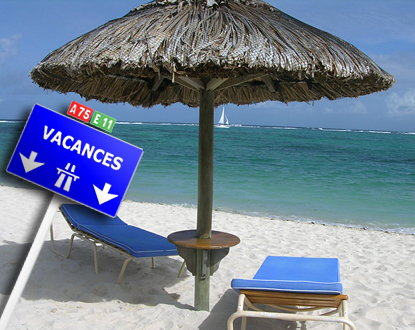For about twenty years, the theme of vacations has enjoyed increased interest. The law of July 29, 1998, regarding the fight against exclusion, even includes them as a national objective. Various support mechanisms, both financial and material, have been implemented at territorial, national, and European levels to remove obstacles to departure.

However, the rate of French people going on vacation annually has slowed significantly over the past two decades. According to the Eurobarometer, the French traveled in 2010 at a higher rate than the average European (with 62% compared to 56%), with residents of the Nordic countries being the most vacation-inclined (75% of Danes).
The proportion of French people going on vacation at least once a year (defined as a leisure trip of at least four nights) is above the European average.
However, even though public effort is significant, this departure rate has not progressed in ten years, reaching a threshold below 70%, and nearly one in two French people will not go this summer.
Beyond financial barriers, which are the primary reason cited, personal, professional causes, and deliberate choices are identified.
At the same level of living, the propensity to be satisfied with one’s daily living environment increases by 30% when one has gone on vacation in the past year.
The expected benefits of a policy facilitating departure are multiple in terms of well-being, empowerment, social connection, parental support, or combating exclusion.
Working to make vacations accessible to as many people as possible invites action on individuals’ financial capabilities, but also on the evolution of the offer to meet the needs of certain groups (young people, those who rarely leave, or those with disabilities, family caregivers, seniors).
Aligning resources, combined with a shared new momentum, could allow for achieving more ambitious objectives.
Vacation practices are evolving towards a fragmentation of departures: French people who go on vacation do so on average more frequently than before (2.2 times in 2004 compared to 1.7 in 1979) but for shorter stays (11.8 days in 2004 compared to 17.2 days in 1979).
The objectives sought by vacationers are to rest (30%); spend time with their loved ones (25%); visit (18%); enjoy the sun and the beach (11%).
Today, a third of those over 15 still do not go, which is problematic for three reasons.
Firstly, these people are excluded from a collective time synonymous with relaxation and personal well-being. Additionally, vacations are sometimes an underutilized tool for achieving other social objectives: empowerment, combating isolation, social diversity, parental support.
Finally, vacation support is more generally part of the policy of supporting purchasing power and the tourism sector.
So, what obstacles to departure can be identified?
How to optimize and coordinate the existing financial aids?
Beyond budgetary support, what actions remain to be undertaken to promote access to vacations for the greatest number?


